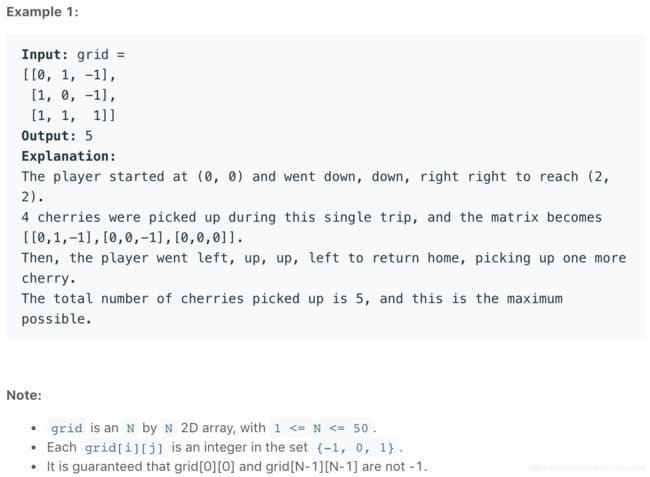- leetcode(1) 3.16-3.22
今天也要好好学习呀!
LeetCode算法
3.16–3.22刷题总结-LeetCode篇两数之和据说是leetcode入门必刷题,小菜鸡在遇到这种题第一反应:暴力!!!嗯,那肯定是不行的,所以,在众多资料中,成功使用HashMap完成了这个题呢。暴力法得时间复杂度为O(n2),在要求降低时间复杂度的情况下,则必须用空间来换。HashMap:建立数字与其坐标位置之间的映射,遍历一个数,另一个预先存储。思路:target-遍历到的数字=另一个
- 算法竞赛备赛——【数据结构】链表
Aurora_wmroy
算法竞赛备赛数据结构算法链表c++蓝桥杯
链表原地逆置206.反转链表-力扣(LeetCode)classSolution{public:ListNode*reverseList(ListNode*head){//链表无头节点原地逆置ListNode*pre=head;ListNode*cur=NULL;ListNode*t=NULL;//t=head->next若head指向空链表会报错非法访问其他空间while(pre!=NULL){
- 杨辉三角 II(js实现,LeetCode:119)
充气大锤
算法leetcode算法职场和发展javascript前端学习笔记
这题是杨辉三角的进阶版题目,所以直接在返回值那里返回整个三角的rowIndex行的数组就可以做出来/***@param{number}rowIndex*@return{number[]}*/vargetRow=function(rowIndex){letarr=[[1],[1,1]]for(leti=1;i0;--j){row[j]+=row[j-1];}}returnrow;};这样优化之后空间
- leetcode:15.三数之和
uncle_ll
编程练习-Leetcodeleetcode三数之和双指针算法训练营数组
15.三数之和来源:力扣(LeetCode)链接:https://leetcode.cn/problems/3sum给你一个包含n个整数的数组nums,判断nums中是否存在三个元素a,b,c,使得a+b+c=0?请你找出所有和为0且不重复的三元组。注意:答案中不可以包含重复的三元组。示例1:输入:nums=[-1,0,1,2,-1,-4]输出:[[-1,-1,2],[-1,0,1]]示例2:输入
- LeetCode第104题_二叉树的最大深度
@蓝莓果粒茶
算法leetcode算法职场和发展c++数据结构pythonc#
LeetCode第104题:二叉树的最大深度题目描述给定一个二叉树,找出其最大深度。二叉树的深度为根节点到最远叶子节点的最长路径上的节点数。说明:叶子节点是指没有子节点的节点。难度简单问题链接https://leetcode.cn/problems/maximum-depth-of-binary-tree/示例示例1:输入:root=[3,9,20,null,null,15,7]输出:3示例2:输
- Leetcode 306. Additive Number
小白菜又菜
Leetcode解题报告leetcodepython深度优先
ProblemAnadditivenumberisastringwhosedigitscanformanadditivesequence.Avalidadditivesequenceshouldcontainatleastthreenumbers.Exceptforthefirsttwonumbers,eachsubsequentnumberinthesequencemustbethesumoft
- leetcode_位运算 67.二进制求和
MiyamiKK57
leetcode算法python
67.二进制求和给你两个二进制字符串a和b,以二进制字符串的形式返回它们的和。1.内置函数classSolution(object):defaddBinary(self,a,b):""":typea:str:typeb:str:rtype:str"""res=int(a,2)+int(b,2)returnbin(res)[2:]时间复杂度分析:int(a,2)和int(b,2):这两步将二进制字符
- leetcode_双指针 557. 反转字符串中的单词 III
MiyamiKK57
leetcode算法职场和发展
557.反转字符串中的单词III给定一个字符串s,你需要反转字符串中每个单词的字符顺序,同时仍保留空格和单词的初始顺序。思路:1.首先用split()切割字符串中用空格分隔的单词2.用切片法反转每个单词3.用join()把反转后的单词用空格连接classSolution(object):defreverseWords(self,s):""":types:str:rtype:str"""#使用spl
- 力扣55.跳跃游戏
进击的jerk
力扣leetcode游戏算法开发语言c++
55.跳跃游戏-力扣(LeetCode)代码区:classSolution{vectorjump(vectornums){intn=nums.size();vectorstep(n,1e6);//全部设置为1e6step[0]=0;for(inti=0;i&nums){intn=nums.size();vectorstep_ans(n);step_ans=jump(nums);if(step_an
- LeetCode215. 数组中的第K个最大元素
techpupil
算法快速选择leetcode
给定整数数组nums和整数k,请返回数组中第k个最大的元素。请注意,你需要找的是数组排序后的第k个最大的元素,而不是第k个不同的元素。你必须设计并实现时间复杂度为O(n)的算法解决此问题。示例1:输入:[3,2,1,5,6,4],k=2输出:5示例2:输入:[3,2,3,1,2,4,5,5,6],k=4输出:4分析:本题我们能想到最简单的方法就是直接给数组排序,然后取第第N-k个元素,但题目要求是
- LeetCode 1092:最短公共超序列
迪小莫学AI
每日算法leetcode算法职场和发展
LeetCode1092:最短公共超序列题目描述LeetCode1092.最短公共超序列是一道困难题。题目要求我们给定两个字符串str1和str2,返回一个最短的字符串,使得str1和str2都是它的子序列。如果答案有多个,可以返回任意一个。题目详情输入:str1:第一个字符串,仅包含小写英文字母。str2:第二个字符串,仅包含小写英文字母。输出:一个最短的字符串,使得str1和str2都是它的子
- 代码随想录算法训练营Day19| LeetCode 77 组合、216 组合总和 III、17 电话号码的字母组合
今天也要早睡早起
代码随想录算法训练营跟练算法leetcodec++数据结构递归回溯
理论基础回溯的本质是穷举,也就是暴力求解,它是递归的一部分。所有回溯法解决的问题都可以抽象为树形结构,因为回溯法解决的都是在集合中递归查找子集,集合的大小构成了树的宽度,递归的深度就构成了树的深度(cr.代码随想录)。应用回溯一般被用于以下几种问题(cr.代码随想录)的求解中:组合问题:N个数里面按一定规则找出k个数的集合切割问题:一个字符串按一定规则有几种切割方式子集问题:一个N个数的集合里有多
- Leetcode-100 贪心算法
LuckyAnJo
leetcodeleetcode贪心算法算法
贪心算法简介贪心算法(GreedyAlgorithm)是一种常见的优化算法,用于解决最优化问题。该算法的核心思想是每次选择当前情况下的最优解,并期望通过这些局部最优解得到全局最优解。贪心算法通常用于那些可以分解为若干个子问题,且每个子问题的最优解可以合成全局最优解的问题。贪心算法之所以有用,是因为它可以快速地做出决策,并能在某些问题上实现较高的效率,避免了回溯与暴力解法的复杂度。贪心算法思想贪心算
- 【C/C++】在排序数组中查找元素的第一个和最后一个位置(leetcode T34)
勇士小蓝0727
c语言c++leetcode开发语言算法数据结构蓝桥杯
核心考点:法一双指针法;法二二分查找法题目描述:给你一个按照非递减顺序排列的整数数组nums,和一个目标值target。请你找出给定目标值在数组中的开始位置和结束位置。如果数组中不存在目标值target,返回[-1,-1]。你必须设计并实现时间复杂度为O(logn)的算法解决此问题。(示例见文末)答案详解:方法一:双指针法vectorsearchRange(vector&nums,inttarge
- 算法每日一练 (17)
张胤尘
算法每日一练算法数据结构
欢迎来到张胤尘的技术站技术如江河,汇聚众志成。代码似星辰,照亮行征程。开源精神长,传承永不忘。携手共前行,未来更辉煌文章目录算法每日一练(17)打家劫舍题目描述解题思路解题代码`c/c++``golang``lua`官方站点:力扣Leetcode算法每日一练(17)打家劫舍题目地址:打家劫舍题目描述你是一个专业的小偷,计划偷窃沿街的房屋。每间房内都藏有一定的现金,影响你偷窃的唯一制约因素就是相邻的
- 算法每日一练 (16)
张胤尘
算法每日一练算法数据结构
欢迎来到张胤尘的技术站技术如江河,汇聚众志成。代码似星辰,照亮行征程。开源精神长,传承永不忘。携手共前行,未来更辉煌文章目录算法每日一练(16)使用最小花费爬楼梯题目描述解题思路解题代码`c/c++``golang``lua`官方站点:力扣Leetcode算法每日一练(16)使用最小花费爬楼梯题目地址:使用最小花费爬楼梯题目描述给你一个整数数组cost,其中cost[i]是从楼梯第i个台阶向上爬需
- # LeetCode题解:最大正方形面积
小学仔
java动态规划算法leetcode矩阵
##题目描述在一个由`'0'`和`'1'`组成的二维矩阵中,找到只包含`'1'`的最大正方形,并返回其面积。**示例**:```输入:matrix=[["1","0","1","0","0"],["1","0","1","1","1"],["1","1","1","1","1"],["1","0","0","1","0"]]输出:4```解释:最大正方形的边长为2,面积为4。---##解题思路##
- LeetCode剑指offer题目记录4
t.y.Tang
LeetCode记录leetcodepython矩阵
leetcode刷题开始啦,每天记录几道题.目录剑指offer07.重建二叉树题目描述示例思路python改进剑指offer09.用两个栈实现队列题目描述示例思路python剑指offer10-1.斐波那契数列题目描述思路pythonC++剑指offer10-2.青蛙跳台阶问题问题描述思路C++剑指offer07.重建二叉树题目描述输入某二叉树的前序遍历和中序遍历的结果,请构建该二叉树并返回其根节
- 代码训练day7哈希表2
徵686
散列表数据结构
1.四数相加IIleetcode454哈希表判断是否存在classSolution{//四数相加ii统计个数publicintfourSumCount(int[]nums1,int[]nums2,int[]nums3,int[]nums4){HashMapmap=newHashMapmagazine.length())returnfalse;//java字符串长度s.length()for(cha
- 算法训练(leetcode)第四十六天 | 110. 字符串接龙、105. 有向图的完全可达性、106. 岛屿的周长
Star Patrick
刷题日记算法leetcode职场和发展
刷题记录*110.字符串接龙105.有向图的完全可达性邻接矩阵邻接表106.岛屿的周长深搜简化代码*110.字符串接龙题目地址使用广搜。本题相当于求最短路径,因此使用广搜。如何应用广搜是一个难点,因为题目给的是字符串而非图的表示(邻接矩阵、邻接表),因此需要自行构建连接关系。题目要求每一步只能修改一个字符,因此从起始字符串开始,对字符串中的每一个字符进行修改,修改后在输入的字符串列表中查找是否存在
- leetcode-hot100-python-专题三:滑动窗口
༺ Dorothy ༻
leetcodehot100leetcodepython算法
1、无重复字符的最长子串中等给定一个字符串s,请你找出其中不含有重复字符的最长子串的长度。示例1:输入:s=“abcabcbb”输出:3解释:因为无重复字符的最长子串是“abc”,所以其长度为3示例2:输入:s=“bbbbb”输出:1解释:因为无重复字符的最长子串是“b”,所以其长度为1。示例3:输入:s=“pwwkew”输出:3解释:因为无重复字符的最长子串是“wke”,所以其长度为3。请注意,
- 代码随想录算法训练营Day10 | Leetcode 150逆波兰表达式求值、239滑动窗口最大值、 347前 K 个高频元素
Dominic_Holmes
leetcodepython算法数据结构
代码随想录算法训练营Day10|Leetcode150逆波兰表达式求值、239滑动窗口最大值、347前K个高频元素一、反转字符串相关题目:Leetcode150文档讲解:Leetcode150视频讲解:Leetcode1501.Leetcode150.逆波兰表达式求值给你一个字符串数组tokens,表示一个根据逆波兰表示法表示的算术表达式。请你计算该表达式。返回一个表示表达式值的整数。注意:有效的
- LeetCode算法题(Go语言实现)_07
LuckyLay
Golang学习笔记算法leetcode职场和发展golang
题目给你一个整数数组nums,返回数组answer,其中answer[i]等于nums中除nums[i]之外其余各元素的乘积。题目数据保证数组nums之中任意元素的全部前缀元素和后缀的乘积都在32位整数范围内。请不要使用除法,且在O(n)时间复杂度内完成此题。一、代码实现funcproductExceptSelf(nums[]int)[]int{n:=len(nums)answer:=make([
- LeetCode剑指offer题目记录3
t.y.Tang
LeetCode记录学语言c++leetcode哈希算法
leetcode刷题开始啦,每天记录几道题.目录剑指offer05.替换空格题目描述思路pythonC++剑指offer06.从尾到头打印链表题目描述思路1python思路2pythonC++剑指offer05.替换空格题目描述让我们实现一个函数,把字符串s中的每个空格替换为%20.思路这个题目我只能想到遍历,在空间控制上应该有原地修改的办法会省一些.python如果用python,那直接用spl
- 搜索插入位置(力扣题)
风继续吹..
LeetCode算法题leetcode算法职场和发展前端
题目:给定一个排序数组和一个目标值,在数组中找到目标值,并返回其索引。如果目标值不存在于数组中,返回它将会被按顺序插入的位置。来源:力扣(LeetCode)请必须使用时间复杂度为O(logn)的算法示例以及输出结果来源:力扣(LeetCode)示例1:输入:nums=[1,3,5,6],target=5输出:2示例2:输入:nums=[1,3,5,6],target=2输出:1示例3:输入:num
- LeetCode 21Merge Two Sorted Lists 合并两个排序链表 Java
我欲混吃与等死
LeetCodeleetcode链表java
题目:将两个已排序的链表合并在一起。举例1:输入:list1=[1,2,4],list2=[1,3,4];输出:[1,1,2,3,4,4];举例2:输入:list1=[],list2=[];输出:[]举例3:输入:list1=[],list2=[0];输出:[0]解题思路:遍历两个链表,比较节点值来合并链表,当其中一个链表遍历完成时,将另一个链表剩余部分拼入新链表。/***Definitionfo
- Leetcode 160 Intersection of Two Linked Lists
xxxmmc
leetcode算法双指针
题意给定两个链表,找这两个链表第一个公共节点,如果没有返回nullptr题目链接https://leetcode.com/problems/intersection-of-two-linked-lists/description/题解两个指针分别从两个链表(记录为表A,表B)的表头出发,并且记录到表尾移动的步数,得到两个指针移动的步数之差xxx。步数之差为正数,那么把表A的指针移动xxx步,否则移
- 力扣 160 - Intersection of Two Linked Lists. (相交链表) Python双指针
小杨快没头发了
Leetcode刷题
力扣160-IntersectionofTwoLinkedLists.(相交链表)Python双指针原题地址:https://leetcode.com/problems/intersection-of-two-linked-lists/Giventheheadsoftwosinglylinked-listsheadAandheadB,returnthenodeatwhichthetwolistsi
- LeetCode 160 Intersection of Two Linked Lists(链表)
nudt_oys
数据结构LeetCode
Writeaprogramtofindthenodeatwhichtheintersectionoftwosinglylinkedlistsbegins.Forexample,thefollowingtwolinkedlists:A:a1→a2↘c1→c2→c3↗B:b1→b2→b3begintointersectatnodec1.Notes:Ifthetwolinkedlistshavenoin
- [LeetCode]--160. Intersection of Two Linked Lists
杜鲁门
LeetCodeLeetCode算法分析leetcode链表相同尾部算法链表遍历算法算法遍历
Writeaprogramtofindthenodeatwhichtheintersectionoftwosinglylinkedlistsbegins.Forexample,thefollowingtwolinkedlists:A:a1→a2↘c1→c2→c3↗B:b1→b2→b3begintointersectatnodec1.Notes:Ifthetwolinkedlistshavenoin
- tomcat基础与部署发布
暗黑小菠萝
Tomcat java web
从51cto搬家了,以后会更新在这里方便自己查看。
做项目一直用tomcat,都是配置到eclipse中使用,这几天有时间整理一下使用心得,有一些自己配置遇到的细节问题。
Tomcat:一个Servlets和JSP页面的容器,以提供网站服务。
一、Tomcat安装
安装方式:①运行.exe安装包
&n
- 网站架构发展的过程
ayaoxinchao
数据库应用服务器网站架构
1.初始阶段网站架构:应用程序、数据库、文件等资源在同一个服务器上
2.应用服务和数据服务分离:应用服务器、数据库服务器、文件服务器
3.使用缓存改善网站性能:为应用服务器提供本地缓存,但受限于应用服务器的内存容量,可以使用专门的缓存服务器,提供分布式缓存服务器架构
4.使用应用服务器集群改善网站的并发处理能力:使用负载均衡调度服务器,将来自客户端浏览器的访问请求分发到应用服务器集群中的任何
- [信息与安全]数据库的备份问题
comsci
数据库
如果你们建设的信息系统是采用中心-分支的模式,那么这里有一个问题
如果你的数据来自中心数据库,那么中心数据库如果出现故障,你的分支机构的数据如何保证安全呢?
是否应该在这种信息系统结构的基础上进行改造,容许分支机构的信息系统也备份一个中心数据库的文件呢?
&n
- 使用maven tomcat plugin插件debug关联源代码
商人shang
mavendebug查看源码tomcat-plugin
*首先需要配置好'''maven-tomcat7-plugin''',参见[[Maven开发Web项目]]的'''Tomcat'''部分。
*配置好后,在[[Eclipse]]中打开'''Debug Configurations'''界面,在'''Maven Build'''项下新建当前工程的调试。在'''Main'''选项卡中点击'''Browse Workspace...'''选择需要开发的
- 大访问量高并发
oloz
大访问量高并发
大访问量高并发的网站主要压力还是在于数据库的操作上,尽量避免频繁的请求数据库。下面简
要列出几点解决方案:
01、优化你的代码和查询语句,合理使用索引
02、使用缓存技术例如memcache、ecache将不经常变化的数据放入缓存之中
03、采用服务器集群、负载均衡分担大访问量高并发压力
04、数据读写分离
05、合理选用框架,合理架构(推荐分布式架构)。
- cache 服务器
小猪猪08
cache
Cache 即高速缓存.那么cache是怎么样提高系统性能与运行速度呢?是不是在任何情况下用cache都能提高性能?是不是cache用的越多就越好呢?我在近期开发的项目中有所体会,写下来当作总结也希望能跟大家一起探讨探讨,有错误的地方希望大家批评指正。
1.Cache 是怎么样工作的?
Cache 是分配在服务器上
- mysql存储过程
香水浓
mysql
Description:插入大量测试数据
use xmpl;
drop procedure if exists mockup_test_data_sp;
create procedure mockup_test_data_sp(
in number_of_records int
)
begin
declare cnt int;
declare name varch
- CSS的class、id、css文件名的常用命名规则
agevs
JavaScriptUI框架Ajaxcss
CSS的class、id、css文件名的常用命名规则
(一)常用的CSS命名规则
头:header
内容:content/container
尾:footer
导航:nav
侧栏:sidebar
栏目:column
页面外围控制整体布局宽度:wrapper
左右中:left right
- 全局数据源
AILIKES
javatomcatmysqljdbcJNDI
实验目的:为了研究两个项目同时访问一个全局数据源的时候是创建了一个数据源对象,还是创建了两个数据源对象。
1:将diuid和mysql驱动包(druid-1.0.2.jar和mysql-connector-java-5.1.15.jar)copy至%TOMCAT_HOME%/lib下;2:配置数据源,将JNDI在%TOMCAT_HOME%/conf/context.xml中配置好,格式如下:&l
- MYSQL的随机查询的实现方法
baalwolf
mysql
MYSQL的随机抽取实现方法。举个例子,要从tablename表中随机提取一条记录,大家一般的写法就是:SELECT * FROM tablename ORDER BY RAND() LIMIT 1。但是,后来我查了一下MYSQL的官方手册,里面针对RAND()的提示大概意思就是,在ORDER BY从句里面不能使用RAND()函数,因为这样会导致数据列被多次扫描。但是在MYSQL 3.23版本中,
- JAVA的getBytes()方法
bijian1013
javaeclipseunixOS
在Java中,String的getBytes()方法是得到一个操作系统默认的编码格式的字节数组。这个表示在不同OS下,返回的东西不一样!
String.getBytes(String decode)方法会根据指定的decode编码返回某字符串在该编码下的byte数组表示,如:
byte[] b_gbk = "
- AngularJS中操作Cookies
bijian1013
JavaScriptAngularJSCookies
如果你的应用足够大、足够复杂,那么你很快就会遇到这样一咱种情况:你需要在客户端存储一些状态信息,这些状态信息是跨session(会话)的。你可能还记得利用document.cookie接口直接操作纯文本cookie的痛苦经历。
幸运的是,这种方式已经一去不复返了,在所有现代浏览器中几乎
- [Maven学习笔记五]Maven聚合和继承特性
bit1129
maven
Maven聚合
在实际的项目中,一个项目通常会划分为多个模块,为了说明问题,以用户登陆这个小web应用为例。通常一个web应用分为三个模块:
1. 模型和数据持久化层user-core,
2. 业务逻辑层user-service以
3. web展现层user-web,
user-service依赖于user-core
user-web依赖于user-core和use
- 【JVM七】JVM知识点总结
bit1129
jvm
1. JVM运行模式
1.1 JVM运行时分为-server和-client两种模式,在32位机器上只有client模式的JVM。通常,64位的JVM默认都是使用server模式,因为server模式的JVM虽然启动慢点,但是,在运行过程,JVM会尽可能的进行优化
1.2 JVM分为三种字节码解释执行方式:mixed mode, interpret mode以及compiler
- linux下查看nginx、apache、mysql、php的编译参数
ronin47
在linux平台下的应用,最流行的莫过于nginx、apache、mysql、php几个。而这几个常用的应用,在手工编译完以后,在其他一些情况下(如:新增模块),往往想要查看当初都使用了那些参数进行的编译。这时候就可以利用以下方法查看。
1、nginx
[root@361way ~]# /App/nginx/sbin/nginx -V
nginx: nginx version: nginx/
- unity中运用Resources.Load的方法?
brotherlamp
unity视频unity资料unity自学unityunity教程
问:unity中运用Resources.Load的方法?
答:Resources.Load是unity本地动态加载资本所用的方法,也即是你想动态加载的时分才用到它,比方枪弹,特效,某些实时替换的图像什么的,主张此文件夹不要放太多东西,在打包的时分,它会独自把里边的一切东西都会集打包到一同,不论里边有没有你用的东西,所以大多数资本应该是自个建文件放置
1、unity实时替换的物体即是依据环境条件
- 线段树-入门
bylijinnan
java算法线段树
/**
* 线段树入门
* 问题:已知线段[2,5] [4,6] [0,7];求点2,4,7分别出现了多少次
* 以下代码建立的线段树用链表来保存,且树的叶子结点类似[i,i]
*
* 参考链接:http://hi.baidu.com/semluhiigubbqvq/item/be736a33a8864789f4e4ad18
* @author lijinna
- 全选与反选
chicony
全选
<!DOCTYPE HTML PUBLIC "-//W3C//DTD HTML 4.01 Transitional//EN" "http://www.w3.org/TR/html4/loose.dtd">
<html>
<head>
<title>全选与反选</title>
- vim一些简单记录
chenchao051
vim
mac在/usr/share/vim/vimrc linux在/etc/vimrc
1、问:后退键不能删除数据,不能往后退怎么办?
答:在vimrc中加入set backspace=2
2、问:如何控制tab键的缩进?
答:在vimrc中加入set tabstop=4 (任何
- Sublime Text 快捷键
daizj
快捷键sublime
[size=large][/size]Sublime Text快捷键:Ctrl+Shift+P:打开命令面板Ctrl+P:搜索项目中的文件Ctrl+G:跳转到第几行Ctrl+W:关闭当前打开文件Ctrl+Shift+W:关闭所有打开文件Ctrl+Shift+V:粘贴并格式化Ctrl+D:选择单词,重复可增加选择下一个相同的单词Ctrl+L:选择行,重复可依次增加选择下一行Ctrl+Shift+L:
- php 引用(&)详解
dcj3sjt126com
PHP
在PHP 中引用的意思是:不同的名字访问同一个变量内容. 与C语言中的指针是有差别的.C语言中的指针里面存储的是变量的内容在内存中存放的地址 变量的引用 PHP 的引用允许你用两个变量来指向同一个内容 复制代码代码如下:
<?
$a="ABC";
$b =&$a;
echo
- SVN中trunk,branches,tags用法详解
dcj3sjt126com
SVN
Subversion有一个很标准的目录结构,是这样的。比如项目是proj,svn地址为svn://proj/,那么标准的svn布局是svn://proj/|+-trunk+-branches+-tags这是一个标准的布局,trunk为主开发目录,branches为分支开发目录,tags为tag存档目录(不允许修改)。但是具体这几个目录应该如何使用,svn并没有明确的规范,更多的还是用户自己的习惯。
- 对软件设计的思考
e200702084
设计模式数据结构算法ssh活动
软件设计的宏观与微观
软件开发是一种高智商的开发活动。一个优秀的软件设计人员不仅要从宏观上把握软件之间的开发,也要从微观上把握软件之间的开发。宏观上,可以应用面向对象设计,采用流行的SSH架构,采用web层,业务逻辑层,持久层分层架构。采用设计模式提供系统的健壮性和可维护性。微观上,对于一个类,甚至方法的调用,从计算机的角度模拟程序的运行情况。了解内存分配,参数传
- 同步、异步、阻塞、非阻塞
geeksun
非阻塞
同步、异步、阻塞、非阻塞这几个概念有时有点混淆,在此文试图解释一下。
同步:发出方法调用后,当没有返回结果,当前线程会一直在等待(阻塞)状态。
场景:打电话,营业厅窗口办业务、B/S架构的http请求-响应模式。
异步:方法调用后不立即返回结果,调用结果通过状态、通知或回调通知方法调用者或接收者。异步方法调用后,当前线程不会阻塞,会继续执行其他任务。
实现:
- Reverse SSH Tunnel 反向打洞實錄
hongtoushizi
ssh
實際的操作步驟:
# 首先,在客戶那理的機器下指令連回我們自己的 Server,並設定自己 Server 上的 12345 port 會對應到幾器上的 SSH port
ssh -NfR 12345:localhost:22
[email protected]
# 然後在 myhost 的機器上連自己的 12345 port,就可以連回在客戶那的機器
ssh localhost -p 1
- Hibernate中的缓存
Josh_Persistence
一级缓存Hiberante缓存查询缓存二级缓存
Hibernate中的缓存
一、Hiberante中常见的三大缓存:一级缓存,二级缓存和查询缓存。
Hibernate中提供了两级Cache,第一级别的缓存是Session级别的缓存,它是属于事务范围的缓存。这一级别的缓存是由hibernate管理的,一般情况下无需进行干预;第二级别的缓存是SessionFactory级别的缓存,它是属于进程范围或群集范围的缓存。这一级别的缓存
- 对象关系行为模式之延迟加载
home198979
PHP架构延迟加载
形象化设计模式实战 HELLO!架构
一、概念
Lazy Load:一个对象,它虽然不包含所需要的所有数据,但是知道怎么获取这些数据。
延迟加载貌似很简单,就是在数据需要时再从数据库获取,减少数据库的消耗。但这其中还是有不少技巧的。
二、实现延迟加载
实现Lazy Load主要有四种方法:延迟初始化、虚
- xml 验证
pengfeicao521
xmlxml解析
有些字符,xml不能识别,用jdom或者dom4j解析的时候就报错
public static void testPattern() {
// 含有非法字符的串
String str = "Jamey친ÑԂ
- div设置半透明效果
spjich
css半透明
为div设置如下样式:
div{filter:alpha(Opacity=80);-moz-opacity:0.5;opacity: 0.5;}
说明:
1、filter:对win IE设置半透明滤镜效果,filter:alpha(Opacity=80)代表该对象80%半透明,火狐浏览器不认2、-moz-opaci
- 你真的了解单例模式么?
w574240966
java单例设计模式jvm
单例模式,很多初学者认为单例模式很简单,并且认为自己已经掌握了这种设计模式。但事实上,你真的了解单例模式了么。
一,单例模式的5中写法。(回字的四种写法,哈哈。)
1,懒汉式
(1)线程不安全的懒汉式
public cla

